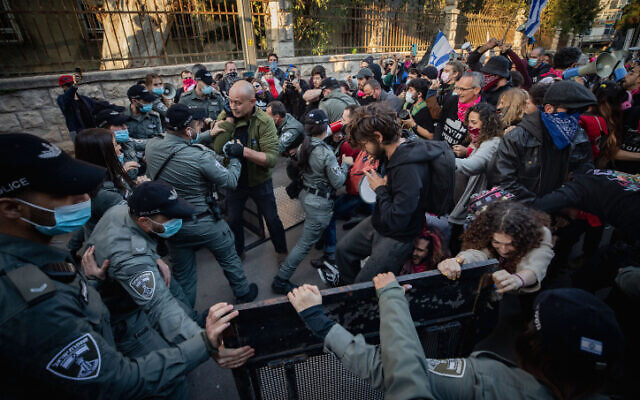The political and social divides threatening Israel
The ramifications of a failure to repair Israel's societal and political fractures will be felt both in Israel and the Diaspora, argues Josh Feldman.

OCTOBER 7, 1973. Day two of the Yom Kippur War. Israel’s hero of the 1967 Six-Day War, Moshe Dayan, had just visited the Syrian front in the Golan Heights. So confident the day prior that he opposed mobilising the entire reserve force, Dayan now returned in an apocalyptic mood, reporting that “the Third Temple” – a reference to the modern State of Israel – was in danger.
Dayan was correct. The IDF was unprepared, undermanned, dangerously overconfident of its strength (and its neighbours’ weakness), and militarily outnumbered both in the Golan and Sinai Peninsula. Just like the two Temples before it – destroyed by the Babylonians and Romans respectively – Israel was now in mortal danger of being overrun by Syria and Egypt.
However, Dayan had missed one vital factor. In 1973, Israeli society was united. While the first two Temples were physically destroyed by external forces, we are taught the true causes of both destructions – and subsequent exiles – were our own sins. The first destruction was punishment for the pervasiveness of the three cardinal sins among Israelites – idolatry, forbidden sexual relations and murder – while the Second Temple’s destruction was a punishment for ‘sinat chinam’: baseless hatred.
Israel does not currently face the imminent physical danger of October 1973. Rather, it faces something far more threatening: a political and social virus that is tearing at the very foundations of Israeli society.
With Israel headed for a fourth election in two years, the political deadlock and corruption that caused it is far more nefarious than it presents on initial inspection. It doesn’t just signal irreconcilable differences between political parties; it highlights that Israeli politicians no longer care for their job description: to work for the betterment of the State of Israel.
Rather, Israel’s political system has become a breeding ground for political dogfights, where emerging victorious is paramount; irrespective of the damage done to Israel’s social fabric, moral standing or security interests.
This has been on full display in recent months, with an emergency coronavirus cabinet rendered near useless due to political mudslinging, peace deals – while excellent developments and in everyone’s best interests – negotiated behind the backs of Israel’s Defence and Foreign Ministers, and the government capitulating to demands from the Charedi sector while the rest of the nation remained in lockdown. The budget, too – and consequently the entire country – suffered from a patent inability to make political compromise.
Let’s not forget the agreed upon “reconciliation cabinet” – aimed at healing divides between increasingly polarised sectors of Israeli society – was never even set up.
Meanwhile, Israel has seen six straight months of nationwide protests against Prime Minister Benjamin Netanyahu, who is in the early stages of his own corruption trial. The crisis is so severe that nearly 50 per cent of Israelis are pessimistic about the future of Israel’s democratic institutions, according to an April poll from the Israel Democracy Institute (IDI).
This political virus, however, is not confined to the walls of the Knesset. Hyper-polarisation and incitement are rife among ordinary Israelis.
An October poll from the IDI revealed 71 per cent of Israelis believe incitement is widespread, while an overwhelming majority view Netanyahu as a target of incitement “to a ‘considerable’ or ‘very large’ extent”. An overwhelming majority across the political divide also feel personally targeted, with 86 per cent of left-wingers viewing “themselves as targets for incitement”. The same is felt by 81 per cent of Charedim, 70 per cent of Arabs and 67 per cent on the political right. To make matters worse, 45 per cent of Israelis believe Israel is “on the verge of another political assassination”.
Despite widespread recognition of nationwide hyper-polarisation and incitement, very few are willing to engage in introspection. When asked “who is to blame” for the incitement, a mere one per cent of the left and 10 per cent of the right blamed their own political base.
Most recently, after a police car chase resulted in the death of 16-year-old Ahuvia Sandak – suspected of throwing stones at Palestinians in Judea and Samaria – nightly demonstrations have seen protesters flip police cars, violently beat police officers, and send death threats. Officers involved in the fatal car chase have been assigned protection.
In 1973, Abba Eban famously quipped that Palestinians “never miss an opportunity to miss an opportunity.” Unfortunately, this has now become the signature trait of Israelis. They are not missing opportunities for peace, however, but rather opportunities to heal the political and social divides threatening Israeli society.
Israelis are all in this project together. The first two Temples were destroyed because we lost sight of that. It’s now up to Israel’s citizens to remember what’s really important – it’s not just their future that depends on it. The ramifications of a failure to repair Israel’s societal and political fractures will be felt both in Israel and the Diaspora.
Josh Feldman is an active member of the community involved in informal education and Israel advocacy, and was part of the Australian delegation to the 38th World Zionist Congress.

comments